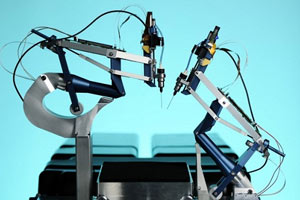COMPUTING RESEARCH HIGHLIGHT OF THE WEEK [April 4 - April 11]
Technique Finds Software Bugs in Surgical Robots
 Surgical robots could make some types of surgery safer and more effective, but proving that the software controlling these machines works as intended is problematic. Researchers at Carnegie Mellon University and the Johns Hopkins University Applied Physics Laboratory have demonstrated that methods for reliably detecting software bugs and ultimately verifying software safety can be applied successfully to this breed of robot.
Surgical robots could make some types of surgery safer and more effective, but proving that the software controlling these machines works as intended is problematic. Researchers at Carnegie Mellon University and the Johns Hopkins University Applied Physics Laboratory have demonstrated that methods for reliably detecting software bugs and ultimately verifying software safety can be applied successfully to this breed of robot.
They used theorem-proving techniques to analyze a control algorithm for a research robot that would help a surgeon perform surgery at the base of the skull. Their method identified a safety flaw that could enable a scalpel or other surgical tool to go dangerously astray in this area, where the eye orbits, ear canals and major arteries and nerves are closely spaced and vulnerable to injury. It also guided development of a new algorithm and verified that the new controller was safe and reliable.
“These techniques are going to change how people build robotic surgery systems,” predicted APL’s Yanni Kouskoulas, who led the research study with André Platzer, assistant professor of computer science at Carnegie Mellon. Platzer and Kouskoulas say this formal verification technique also could change the way regulators evaluate new devices, providing more assurance of safety than is possible even with the most rigorous testing.
Surgical robots are an example of a hybrid, or cyber-physical system — complex, computer-controlled devices that are becoming increasingly common. Other examples are aircraft collision avoidance systems and cars that avoid collisions, maintain their lanes or otherwise drive themselves.
“Because the consequences of these systems malfunctioning are so great, finding a way to prove they are free of design errors has been one of the most important and pressing challenges in computer science,” Platzer said.
Full Article...
Source: Carnegie Mellon University, Johns Hopkins University Applied Physics Laboratory
Researchers:
Andre Platzer (Carnegie Mellon University)
David Renshaw (Carnegie Mellon University)
Yanni Kouskoulas (Johns Hopkins University Applied Physics Lab)
Peter Kazanzides (Johns Hopkins University)
‹ Current Highlight | Past Highlights ›
Computing Research Highlight of the Week is a service of the Computing Community Consortium and the Computing Research Association designed to highlight some of the exciting and important recent research results in the computing fields. Each week a new highlight is chosen by CRA and CCC staff and volunteers from submissions from the computing community. Want your research featured? Submit it!.




